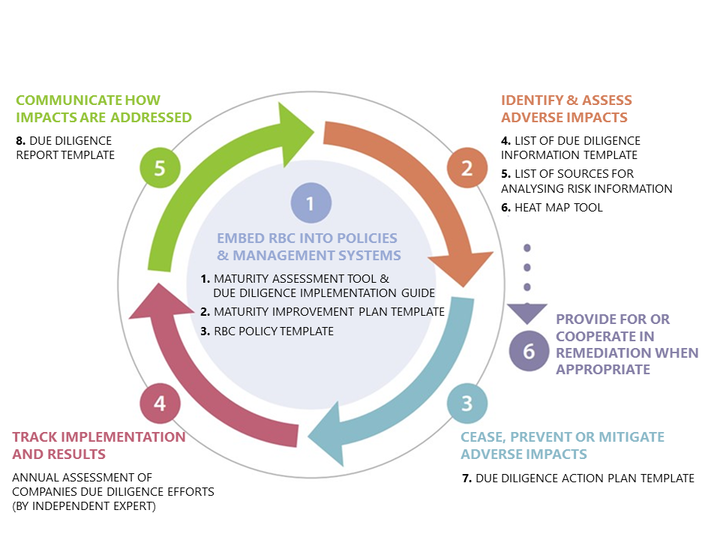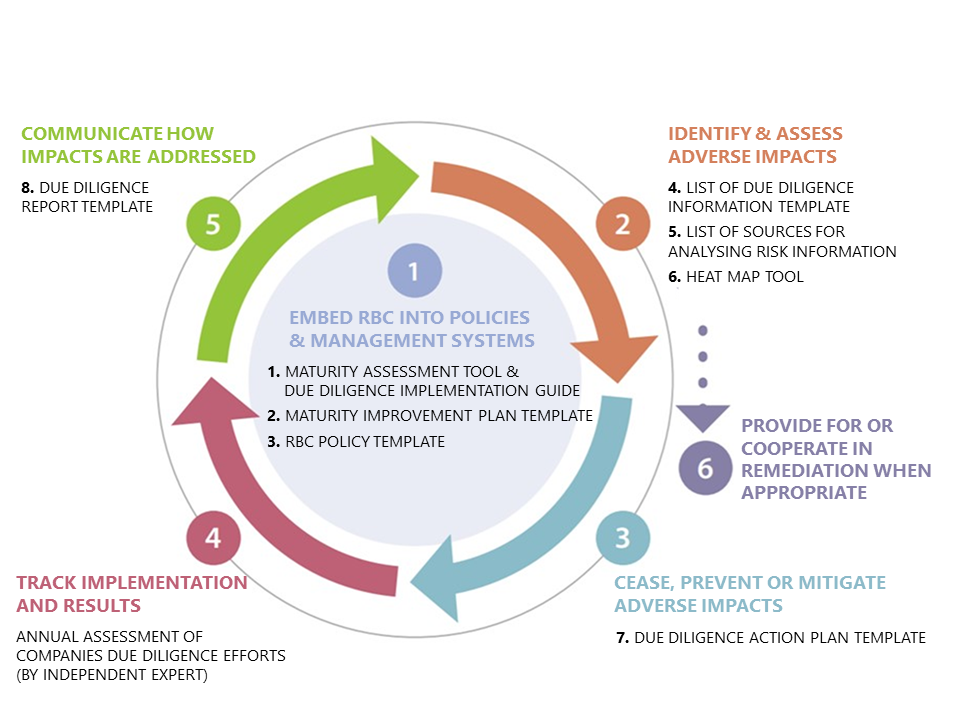
November 2020
Annual Progress Report Metals 2019/2020
Individual Company and Collective Due Diligence
Due diligence is the process companies need to take to ensure that actual or potential adverse impacts on people and the environment are identified and addressed. Due diligence involves risk-based due diligence by individual companies based on the six steps of the OECD Guidance for Responsible Business Conduct. A working group on due diligence supports the due diligence activities of the companies. The parties developed a number of tools and templates together to assist companies in carrying out this task.

The following tools and templates are currently available for the companies:
- A ‘maturity assessment tool’ (MAT) based on the 6-step OECD due diligence approach. It helps the companies determine their maturity level regarding the implementation of their due diligence and forms the baseline to track their progress. This tool is supported by an ‘assessment framework’ that guides the companies on how to assess their company in the MAT. A ‘due diligence implementation guide’ which defines and clarifies important terms and concepts used in the due diligence process and in the MAT.
- A template ‘maturity improvement plan’ in which the companies set targets and indicate how they will improve their approach due diligence.
- A template for the development of a ‘public RBC policy’, which is a publication that describes a company’s approach to due diligence and possible remediation measures.
- A template ’list of due diligence information’ to collect necessary information about a company’s supply chain for the risk assessment, such as locations of suppliers of metals.
- A ‘list of information sources’ that can help companies to assess actual or potential international RBC risks in their supply chains.
- A ‘heat map’ tool which assists companies with the prioritisation of international RBC risks according to the OECD Guidance.
- A template ‘due diligence action plan’ where companies can indicate which actual or potential international RBC risks they will address and how.
- A template ‘public reporting on due diligence’ that assists companies with reporting publicly about their due diligence activities.
Kick-off
The parties organised a due diligence kick-off session in November 2019. All the companies’ representatives were present. The level of knowledge regarding due diligence varied widely, but the group was enthusiastic and eager to learn. A second session was held in February 2020, the focus was on assisting the companies with finalising their ‘Maturity Assessment Tool’ (MAT) and the list of due diligence information.
Due Diligence
As of 30 June 2020, six out the seven signatory companies had completed their MAT while one company had submitted a completed ‘maturity improvement plan’. Five of the companies had also delivered a ‘list with due diligence information’. These deliverables had a deadline planned for year 1; not all companies managed to meet their due diligence deadlines. Other activities planned for year 1 which are still pending are the completion of a ‘due diligence action plan’ and the ‘heat map’. The deadlines for the action plan and the heat map were extended to year 2. The working group has made its first steps with developing a ‘due diligence support program’ to assist the companies with tailor-made support.
The working group has also provided their expertise in the field of due diligence and international RBC in general for the update of the raw materials scanner (“Grondstoffenscanner”). This scanner is a raw materials risk assessment tool offered by the Dutch Government . It is used by a broad range of companies that source minerals to assess supply chain risks.
Kay Nimmo, ITA

Irene Grannetia-Morittu, General Manager Climax Molybdenum BV
“Society increasingly expects companies to take responsibility for promoting and encouraging better practices in their production and supply chains. We are dedicated to a safe, fair and sustainable mining and metals industry. We seek to make a positive contribution to the United Nations Sustainable Development Goals, while mitigating any potential impediments to their realisation. This includes implementing 38 performance expectations unanimously approved by ICMM’s Council of CEOs in December 2018 and assuring they are met at the site level. As a part of this effort, we are working with our supply chains to better understand and improve sustainability performance globally. Participation in the Metals Agreement aligns very well with this work, and we look forward to the continued collaboration and positive impact it will have.”
